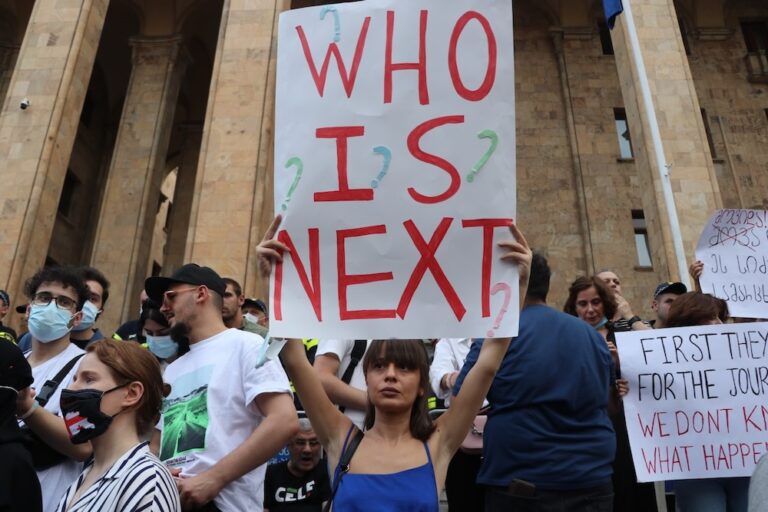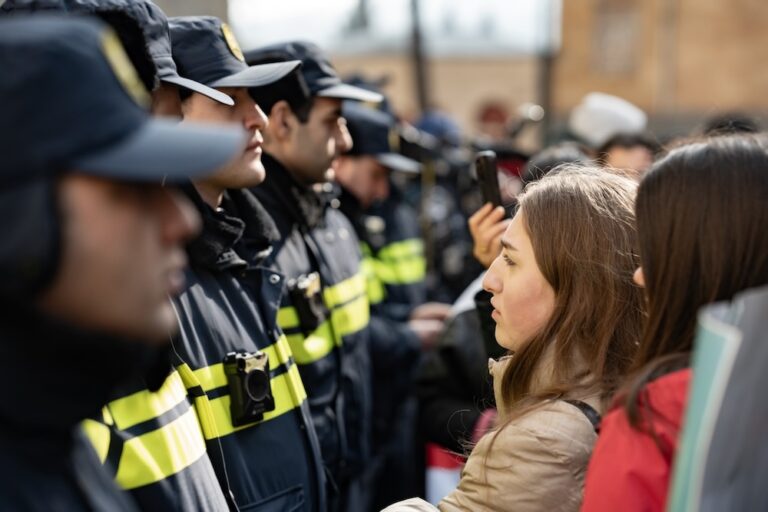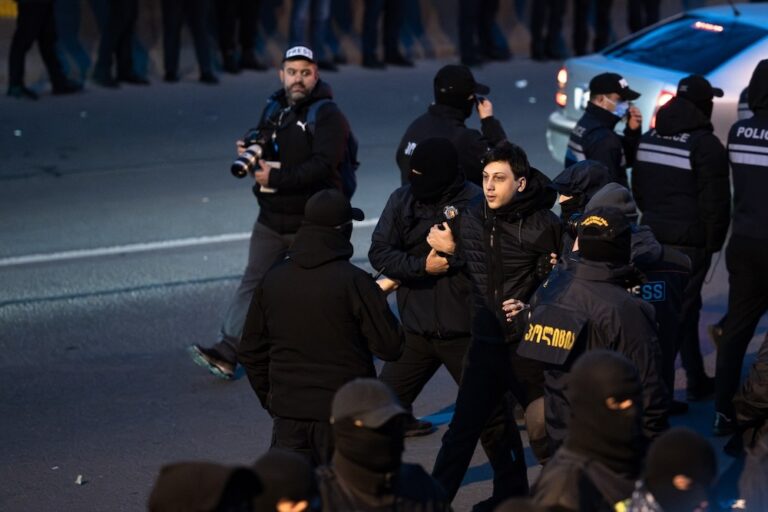Police have arrested at least 28 people on administrative charges in Georgia as protests have swelled in response to a prison abuse scandal.
(Human Rights Watch/IFEX) – Tbilisi, September 26, 2012 – Georgia’s use of administrative detention to lock up protesters and political activists violates the country’s international commitments to safeguard against arbitrary detention, Human Rights Watch said today. The government should immediately ensure all those deprived of liberty enjoy their full due process rights and receive a fair trial regardless of whether the charges against them are administrative or criminal.
In recent weeks, protests across the country have swelled in response to a prison abuse scandal, and Georgian media and political parties are reporting that police have arrested more than 28 people since September 21, 2012, on administrative, or misdemeanor, charges of disobeying police orders. Those arrested have been sentenced to up to 40 days’ imprisonment. They include activists for the Georgian Dream opposition coalition and at least six other people actively involved in the recent protest rallies in Tbilisi. The protests are taking place less than a week before the October 1 parliamentary elections.
“Anyone arrested for a misdemeanor offense is entitled to due process, and their basic rights in detention must be respected,” said Giorgi Gogia, senior Europe and Central Asia researcher at Human Rights Watch. “A misdemeanor charge may not lead to a permanent criminal record, but the punishment imposed qualifies as a criminal punishment.”
Georgia’s Code of Administrative Offences sets out prison sentences of up to 90 days for minor public order breaches, but does not provide for adequate due process rights, so that many facing administrative charges may end up in arbitrary detention. The Code does not require police to inform defendants promptly of their rights or to provide reasons for their detention. Several lawyers representing recent detainees told Human Rights Watch that the trials were perfunctory, with judges not allowing defense council to examine witnesses or introduce evidence.
Courts have consistently found all detainees guilty of violating the administrative code and sentenced almost all of them to imprisonment ranging from 10 to 40 days. One activist was released on September 25 after he had been fined GEL400 (US$242).
At least seven individuals were detained in four separate incidents in Tbilisi on September 21, 22, and 25 under similar circumstances. The Ministry of Interior stated on its website that all seven defendants disobeyed police orders and insulted them.
A lawyer for Davit Patsatsia, detained on September 21 and sentenced to 40 days administrative imprisonment, told Human Rights Watch that he was not allowed to provide an effective defense during the Tbilisi City Court hearing. The judge did not allow him and his client to question the policemen who wrote their arrest report; declined a motion to hear a defense witness who was present during the arrest, claiming he would be biased; and rejected a motion to introduce video evidence from a CCTV camera installed at the scene of the incident.
Dachi Tsaguria, 30, one of the organizers of student protests in Tbilisi, was detained on September 22 and sentenced to 10 days’ administrative imprisonment for disobeying a police order and insulting a policeman. Bekar Aladoshvili, another activist, was detained together with Tsaguria and sentenced to 10 days at the same hearing. Their lawyer told Human Rights Watch that the judge granted only one of 10 defense motions – to hear police testimony – and even then did not allow the defense to ask any questions. He and his clients had only 10 minutes to familiarize themselves with the case file and prepare their defense, which he claims was insufficient. Furthermore, Tsaguria alleged that he had been beaten during the arrest and again in police custody and he bore visible bruises during the trial. However, the judge did not inquire about the nature and circumstances of the injuries or refer the case to a prosecutor for investigation. The Ombudsman’s office representatives, who visited Tsaguria a day after his detention, confirmed that he indeed had bruises and that he claimed to have sustained them as a result of police ill-treatment.
“Anyone facing detention has the right to a real trial with a real defense, it should never be a rubber stamp,” Gogia said. “Authorities should swiftly and effectively investigate any allegations of ill-treatment in police custody.”


